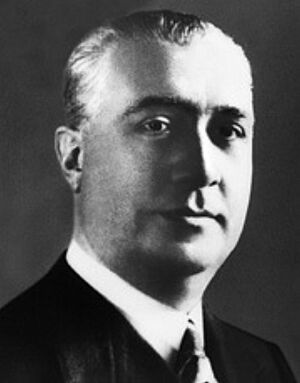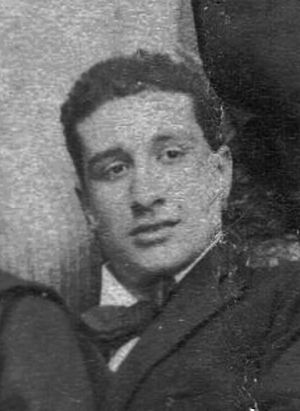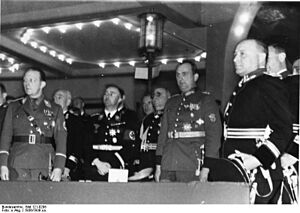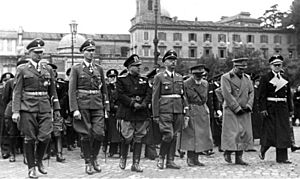Arturo Bocchini facts for kids
Quick facts for kids
Arturo Bocchini
|
|
|---|---|
 |
|
| Chief of the Police | |
| In office 13 September 1926 – 20 November 1940 |
|
| Monarch | Victor Emmanuel III |
| Prime Minister | Benito Mussolini |
| Preceded by | Francesco Crispo Moncada |
| Succeeded by | Carmine Senise |
| Member of the Senate of the Kingdom | |
| In office 16 November 1933 – 20 November 1940 |
|
| Personal details | |
| Born | February 12, 1880 San Giorgio La Montagna, Campania, Kingdom of Italy |
| Died | November 20, 1940 (aged 60) Rome, Lazio, Kingdom of Italy |
| Political party | National Fascist Party |
| Occupation | Civil servant |
Arturo Bocchini (born February 12, 1880 – died November 20, 1940) was an important Italian government worker. He became the Chief of the Police under the Fascist government led by Benito Mussolini.
Bocchini held this powerful job from September 1926 until he passed away in November 1940. He was a very important person in the Italian government at that time.
He was in charge of both the regular police, called the State Police, and the secret police known as OVRA. This secret police group watched people closely across Italy. Bocchini answered only to Mussolini, who was called the "Duce" (leader). He worked without much interference from others. Because of his great power, people sometimes called him the "Vice Duce."
Early Life and Career
Arturo Bocchini was born in a town called San Giorgio La Montagna, near Benevento. He was the youngest of seven children. His father, Ciriaco Bocchini, was a wealthy landowner. His mother, Concetta Padiglione, came from an important family.
In 1902, Bocchini finished his law degree at the Federico II University in Naples. After that, he started working for the government as a civil servant.
When Benito Mussolini came to power in 1922, Bocchini was given important roles. He served as the top government official, called a Prefect, in several cities. He was Prefect of Brescia from 1922 to 1923, then Bologna from 1923 to 1925, and finally Genoa from 1925 to 1926.
National Chief of Police Role
In 1926, Mussolini chose Bocchini to be the Chief of Police for Rome. This meant he was also in charge of all police and security forces in Fascist Italy. Mussolini was advised by Luigi Federzoni, who knew Bocchini well.
Bocchini controlled the regular Polizia di Stato and the OVRA. The OVRA was the political police force of the National Fascist Party. However, another national police force, the Carabinieri, remained under the control of the army.
Mussolini gave Bocchini the job of keeping order in Italy. To do this, Bocchini had a lot of power and freedom to act. He also had the special privilege of reporting directly to Mussolini himself.
As Rome's Chief of Police, Bocchini oversaw the arrest of many people who opposed the Fascist government. One famous person arrested was Antonio Gramsci, who died in 1937.
Bocchini's power grew because of his close connection with his German counterpart, Reichsführer-SS Heinrich Himmler. Himmler was a top leader in Germany's security forces. They met during official visits in 1936 (in Germany) and 1938 (in Italy). They discussed how their police forces, the OVRA and Germany's Gestapo, could work together. They aimed to share information and arrest political enemies internationally.
Death
Arturo Bocchini died in Rome in November 1940 after suffering a stroke. His funeral was attended by many important leaders from Germany's police and security groups. These included Heinrich Himmler, Karl Wolff, and Reinhard Heydrich.
 | James Van Der Zee |
 | Alma Thomas |
 | Ellis Wilson |
 | Margaret Taylor-Burroughs |




